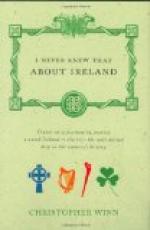The outcome of this visit was two papers which were written for the New Review—with the editor of whom, however, I stood somewhat in the position of Balaam with Balak, when, called on to curse the Israelites, he was forced by a superior power to bless them. So I with the Unionists. The first paper was sent and passed, but it was delayed by editorial difficulties through the critical months of the bye-elections. When published in the December number, owing to the exigencies of space, the backbone—namely the extracts from the Land Acts, now included in this re-publication—was taken out of it, and my own unsupported statements alone were left. I was sorry for this, as it cut the ground from under my feet and left me in the position of one of those mere impressionists who have already sufficiently darkened counsel and obscured the truth of things. As the same editorial difficulties and exigencies of space would doubtless delay the second paper, like the first, I resolved, by the courteous permission of the editor, to enlarge and publish both in a pamphlet for which I alone should be responsible, and which would bind no editor to even the semblance of endorsement.
I, only half-enlightened, write, as has been said, for the wholly blind and ignorantly ardent who, as I did, accept sentiment for fact and feeling for demonstration; who do not look at the solid legal basis on which the present Government is dealing with the Irish question; who believe all that the Home Rulers say, and nothing that the Unionists demonstrate. I want them to study the plain and indisputable facts of legislation as I have done, when I think they must come to the same conclusions as those which have forced themselves on my own mind—namely, that the Home Rule desired by the Parnellites is not only a delusive impossibility, but is also high treason against the integrity of the Empire, and would be a base surrender of our obligations to the Irish Loyalists; that, whatever the landlords were, they are now more sinned against than sinning; and that in the orderly operation of the Land Acts now in force, with the stern repression of outrages[A] and punishment of crimes, for which peaceable folk are so largely indebted to Mr. Balfour, lies the true pacification of this distressed and troubled country.
E. LYNN LINTON.
ABOUT IRELAND.
I.
Nothing dies so hard as prejudice, unless it be sentiment. Indeed, prejudice and sentiment are but different manifestations of the same principle by which men pronounce on things according to individual feeling, independent of facts and free from the restraint of positive knowledge. And on nothing in modern times has so much sentiment been lavished as on the Irish question; nowhere has so much passionately generous, but at the same time so much absolutely ignorant, partisanship been displayed as by English sympathisers




